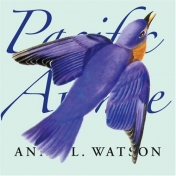BKMT READING GUIDES
Pacific Avenue
by Anne L. Watson
Paperback : 320 pages
0 club reading this now
0 members have read this book
Introduction
Where do you go from the end of the line? This is the question facing Kathy Woodbridge as she steps off the bus in the port city of San Pedro, California. Nineteen years old, from Louisiana, she is running away from her past. There's a lot to run away from. What do you do when there's no one to do for? That's what Lacey Greer wants to know, with her only child off at college. When Kathy gets a job at the office where Lacey works, she can tell that Kathy's in trouble. Lacey's husband advises her to stay out of it -- but what's she supposed to do, buy a rocking chair? Set in San Pedro, Baton Rouge, and New Orleans in the early seventies, Pacific Avenue explores themes of love, belonging, helpfulness, hope, forgiveness, reconciliation, interracial marriage, and healing from the trauma of war. At the end of the line, will Kathy find a way to return home?
Excerpt
Chapter 1December 1974, Interstate 10, Westbound
Kathy
I chose a window seat on the Greyhound, but I didn't look out. For almost the whole trip, I stared at the rough tan upholstery of the seat in front of me. It had a rip on one side and three dark stains. ...
Discussion Questions
1. Compare the issues of the early 1970s with issues today. How might the story have played out differently in the present?2. To what extent are the novel's themes tied to its locations? Would the story have unfolded differently in other cities?
3. Kathy's family members differ greatly in their positions on contemporary issues. How does this affect her own opinions?
4. Richard fears racial violence less than Kathy does. Could this be due to his military upbringing? How and why does the racial culture of military bases differ from that of civilian towns?
5. Lacey has wildly conflicting feelings about her daughter growing up. Have you experienced something like this yourself or seen it in others? Is it more common when the child is an only child?
6. Lacey believes that gender discrimination is harder to fight than is racial discrimination. Is she right?
7. Because of Jamie, Kathy's father undergoes a change of heart. To what extent does the appeal of his grandchild override his feelings about Richard? How might his attitude have changed further if he had lived another twenty years?
8. Do you believe that Kathy and Richard have a strong future together?
Notes From the Author to the Bookclub
I began Pacific Avenue with a greater sense of place than of characters. I put my main character, Kathy, into the gritty world of Pacific Avenue in San Pedro, California, a place I knew well. To my surprise, she began to walk around, think for herself, and talk back to me. She brought up long-forgotten pictures of my years in New Orleans as well. Of men who came back from Vietnam, with their unimaginable memories. Of families struggling with the war, and with racial justice. Kathy is a young woman who "lives in interesting times," as the saying goes. So, Pacific Avenue grew out of my love of these two places -- San Pedro and New Orleans -- and out of memories of the turbulent late '60s and early '70s. But it is not simply a political novel. It is a story of personal lives, loves, and coming of age. It's also a story of an artist's development: Kathy becomes a puppeteer, and the puppets' stories are added to her own. Years before I wrote the book, I was a puppeteer myself. When my husband suggested I include this experience in the book, I knew it was exactly what the story needed. Though it deals with serious issues, this is not a novel of despair. Instead, it weaves together love, loss, altruism, and forgiveness. I see it as a story of hope.Book Club Recommendations
Recommended to book clubs by 0 of 0 members.
Book Club HQ to over 90,000+ book clubs and ready to welcome yours.
Get free weekly updates on top club picks, book giveaways, author events and more








